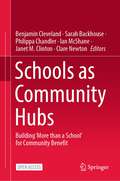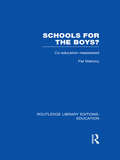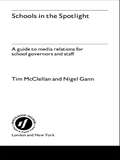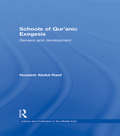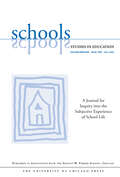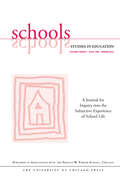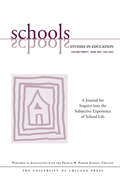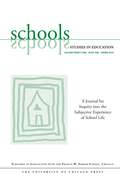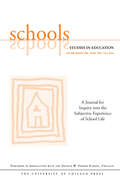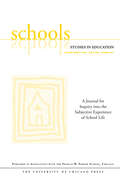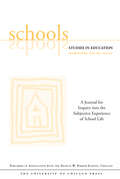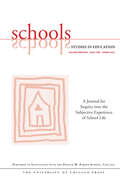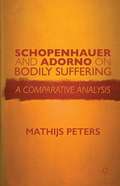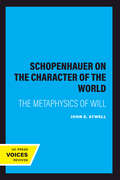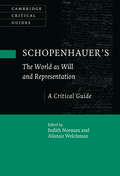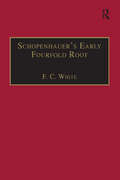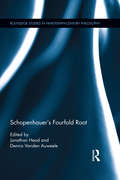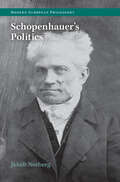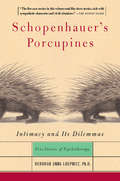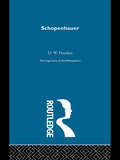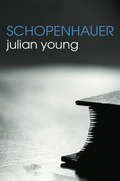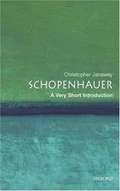- Table View
- List View
Schools as Community Hubs: Building ‘More than a School’ for Community Benefit
by Benjamin Cleveland Ian McShane Sarah Backhouse Philippa Chandler Janet M. Clinton Clare NewtonThis open access book brings together research on the planning, design, governance and management of schools as community hubs—places that support the development of better-connected, more highly integrated, and more resilient communities with education at the centre. It explores opportunities and difficulties associated with bringing schools and communities closer together, with a focus on the facilities needed to accommodate shared experiences that generate social capital and deliver reciprocal benefits.This book discusses the expanded roles of schools, and investigates how schools may offer more to their communities—historically, currently and into the future—with respect to the role of the built environment in situating community activities and services.Organised around four sections, it showcases important areas of development in the field via an interdisciplinary approach, which weaves together empirical research with theoretical insights and practical examples. This book not only highlights the challenges associated with the development of schools as community hubs but offers evidence-based insights into how to overcome such hurdles to develop community-facing schools into the future.
Schools for the Boys?: Co-education reassessed (Routledge Library Editions: Education)
by Pat MahonyDo girls do better in single-sex or co-educational schools? Up to now, discussion has centred on girls’ academic achievements in single or mixed-sex groups, but Pat Mahony’s research clearly demonstrates that this is not the only issue, and that co-education is damaging for girls socially as well as academically. She challenges the argument that co-education is desirable because it is more normal. Her research reveals that it is normal for girls to be ‘put down’ in class, to be verbally abused and sexually harassed by boys, and yes, this will be their ‘normal’ experience as women. But does this justify the way girls are treated in schools? Pat Mahony goes on to explore some of the reasons behind this state of affairs and suggests that the answer lies in sexual politics, not biology. The book concludes with practical suggestions for bringing about change in schools, including case-studies from existing projects.
Schools in the Spotlight: A Guide to Media Relations for School Governors and Staff
by Nigel Gann Mr Nigel Gann Tim McClellan Tim McclellanWhat role does a school play in a community and society?This book examines the need for educational establishments to review their position in the local community and to develop strategies to deal with the management of their image. Increasing parental choice means that schools must begin to adopt marketing concepts and tell people what is happening both inside and outside the classroom.Techniques to generate, revisit and challenge a school's ethos are discussed together with ways of getting this message across to the wider community. Effective management of a school's image through judicious handling of the media can lead to better results, higher self-esteem for staff and pupils and a greater recognition of a school's contribution to a local community.This book gives practical guidance on how to identify potential news items and how to convince local newspapers, television and radio organisations to use the story. The book contains many examples of how schools have put comprehensive framework to effective media communication and how to avoid potential pitfalls.
Schools of Qur'anic Exegesis: Genesis and Development (Culture and Civilization in the Middle East)
by Hussein Abdul-RaofQur’anic exegesis has become the battleground of political Islam and theological conflict among various Muslim schools of thought. Using comparative and contrastive methodology, examples from the Qur'an are investigated in the light of various theological views to delineate the birth, development and growth of Qur'anic exegesis. The political status quo, in the past and at present, has impinged upon Qur’anic exegesis more than on any other discipline in Islamic studies. This book illustrates the dichotomy between mainstream and non-mainstream Islam, showing how Qur’anic exegesis reflects the subtle dogmatic differences and political cleavages in Islamic thought. Chapters explore in depth the intrusive views of the compilers of early exegesis manuscripts, the scepticism among Western scholars about the authenticity of early Muslim works of exegesis and of prophetic tradition, and the role of exegesis as a tool to reaffirm the Qur’an as a canon. Written to appeal to those with comparative exegetical interests as well as those focused on Islamic studies in general, this book will be an important reference for research students, scholars, and students of Islamic Studies, Theology, Religious studies and Middle Eastern Studies.
Schools, volume 19 number 2 (Fall 2022)
by SchoolsThis is volume 19 issue 2 of Schools. Schools: Studies in Education provides a forum for classroom educators to describe and meditate on the complex experiences of school life. The journal publishes scholarly articles, reflective essays, and stories that convey how human relationships, thoughts, and emotions shape the meaning of what happens when learning actually occurs. Historical documents in “From the Archives” feature intriguing excerpts from works that provide insight into contemporary issues. Opinion pieces in “On the Horizon” feature arguments about the future of education planning and policy. Reviews critically evaluate books, films, art exhibitions, concerts, and other events that have some bearing on the meaning and value of education.
Schools, volume 20 number 1 (Spring 2023)
by SchoolsThis is volume 20 issue 1 of Schools. Schools: Studies in Education provides a forum for classroom educators to describe and meditate on the complex experiences of school life. The journal publishes scholarly articles, reflective essays, and stories that convey how human relationships, thoughts, and emotions shape the meaning of what happens when learning actually occurs. Historical documents in “From the Archives” feature intriguing excerpts from works that provide insight into contemporary issues. Opinion pieces in “On the Horizon” feature arguments about the future of education planning and policy. Reviews critically evaluate books, films, art exhibitions, concerts, and other events that have some bearing on the meaning and value of education.
Schools, volume 20 number 2 (Fall 2023)
by SchoolsThis is volume 20 issue 2 of Schools. Schools: Studies in Education provides a forum for classroom educators to describe and meditate on the complex experiences of school life. The journal publishes scholarly articles, reflective essays, and stories that convey how human relationships, thoughts, and emotions shape the meaning of what happens when learning actually occurs. Historical documents in “From the Archives” feature intriguing excerpts from works that provide insight into contemporary issues. Opinion pieces in “On the Horizon” feature arguments about the future of education planning and policy. Reviews critically evaluate books, films, art exhibitions, concerts, and other events that have some bearing on the meaning and value of education.
Schools, volume 21 number 1 (Spring 2024)
by SchoolsThis is volume 21 issue 1 of Schools. Schools: Studies in Education provides a forum for classroom educators to describe and meditate on the complex experiences of school life. The journal publishes scholarly articles, reflective essays, and stories that convey how human relationships, thoughts, and emotions shape the meaning of what happens when learning actually occurs. Historical documents in “From the Archives” feature intriguing excerpts from works that provide insight into contemporary issues. Opinion pieces in “On the Horizon” feature arguments about the future of education planning and policy. Reviews critically evaluate books, films, art exhibitions, concerts, and other events that have some bearing on the meaning and value of education.
Schools, volume 21 number 2 (Fall 2024)
by SchoolsThis is volume 21 issue 2 of Schools. Schools: Studies in Education provides a forum for classroom educators to describe and meditate on the complex experiences of school life. The journal publishes scholarly articles, reflective essays, and stories that convey how human relationships, thoughts, and emotions shape the meaning of what happens when learning actually occurs. Historical documents in “From the Archives” feature intriguing excerpts from works that provide insight into contemporary issues. Opinion pieces in “On the Horizon” feature arguments about the future of education planning and policy. Reviews critically evaluate books, films, art exhibitions, concerts, and other events that have some bearing on the meaning and value of education.
Schools, volume 22 number 1 (Spring 2025)
by SchoolsThis is volume 22 issue 1 of Schools. Schools: Studies in Education provides a forum for classroom educators to describe and meditate on the complex experiences of school life. The journal publishes scholarly articles, reflective essays, and stories that convey how human relationships, thoughts, and emotions shape the meaning of what happens when learning actually occurs. Historical documents in “From the Archives” feature intriguing excerpts from works that provide insight into contemporary issues. Opinion pieces in “On the Horizon” feature arguments about the future of education planning and policy. Reviews critically evaluate books, films, art exhibitions, concerts, and other events that have some bearing on the meaning and value of education.
Schools: Studies in Education, volume 18 number 2 (Fall 2021)
by Schools: Studies in EducationThis is volume 18 issue 2 of Schools: Studies in Education. Schools: Studies in Education provides a forum for classroom educators to describe and meditate on the complex experiences of school life. The journal publishes scholarly articles, reflective essays, and stories that convey how human relationships, thoughts, and emotions shape the meaning of what happens when learning actually occurs. Historical documents in “From the Archives” feature intriguing excerpts from works that provide insight into contemporary issues. Opinion pieces in “On the Horizon” feature arguments about the future of education planning and policy. Reviews critically evaluate books, films, art exhibitions, concerts, and other events that have some bearing on the meaning and value of education.
Schools: Studies in Education, volume 19 number 1 (Spring 2022)
by Schools: Studies in EducationThis is volume 19 issue 1 of Schools: Studies in Education. Schools: Studies in Education provides a forum for classroom educators to describe and meditate on the complex experiences of school life. The journal publishes scholarly articles, reflective essays, and stories that convey how human relationships, thoughts, and emotions shape the meaning of what happens when learning actually occurs. Historical documents in “From the Archives” feature intriguing excerpts from works that provide insight into contemporary issues. Opinion pieces in “On the Horizon” feature arguments about the future of education planning and policy. Reviews critically evaluate books, films, art exhibitions, concerts, and other events that have some bearing on the meaning and value of education.
Schopenhauer A Biography
by David E. CartwrightArthur Schopenhauer (1788-1860) was one of the most original and provocative thinkers of the nineteenth century. He spent a lifetime striving to understand the meaning of living in a world where suffering and death are ubiquitous. In his quest to solve "the ever-disquieting riddle of existence," Schopenhauer explored almost every dimension of human existence, developing a darkly compelling worldview that found deep resonance in contemporary literature, music, philosophy, and psychology. This is the first comprehensive biography of Schopenhauer written in English. Placing him in his historical and philosophical contexts, David E. Cartwright tells the story of Schopenhauer's life to convey the full range of his philosophy. He offers a fully documented portrait in which he explores Schopenhauer's fractured family life, his early formative influences, his critical loyalty to Kant, his personal interactions with Fichte and Goethe, his ambivalent relationship with Schelling, his contempt for Hegel, his struggle to make his philosophy known, and his reaction to his late-arriving fame. The Schopenhauer who emerges in this biography is the complex author of a philosophy that had a significant influence on figures as diverse as Samuel Beckett, Jorge Luis Borges, Emile Durkheim, Sigmund Freud, Thomas Hardy, Thomas Mann, Friedrich Nietzsche, and Ludwig Wittgenstein.
Schopenhauer and Adorno on Bodily Suffering
by Mathijs PetersPeters discusses Schopenhauer and Adorno, two philosophers whose writings have hitherto not been extensively compared in the English-speaking academic world. Focusing on their ideas about pain and bodily suffering, the author creates a stimulating tension between the ahistorical nature of Schopenhauer's philosophy and the deeply historical character of Adorno's critical analyses. He explores the common themes in their work, in that both have been accused of defending pessimistic theories, in which the notion of freedom disappears and is replaced by an emphasis on metaphysical and social determination. Without overlooking the differences between the two authors, Peters argues that Schopenhauer and Adorno's pessimism is intertwined with hopeful analyses of compassion with bodily suffering, the redeeming qualities of the arts, and descriptions of experiences of a metaphysical nature. His fascinating study enhances our understanding of Schopenhauer and Adorno and the former's influence on Critical Theory. It furthermore is a valuable contribution to our ideas about pessimism, optimism and social critique.
Schopenhauer and the Aesthetic Standpoint
by Sophia VasalouWith its pessimistic vision and bleak message of world-denial, it has often been difficult to know how to engage with Schopenhauer s philosophy. His arguments have seemed flawed and his doctrines marred by inconsistencies; his very pessimism almost too flamboyant to be believable. Yet a way of redrawing this engagement stands open, Sophia Vasalou argues, if we attend more closely to the visionary power of Schopenhauer s work. The aim of this book is to place the aesthetic character of Schopenhauer s standpoint at the heart of the way we read his philosophy and the way we answer the question: why read Schopenhauer - and how? Approaching his philosophy as an enactment of the sublime with a longer history in the ancient philosophical tradition, Vasalou provides a fresh way of assessing Schopenhauer s relevance in critical terms. This book will be valuable for students and scholars with an interest in post-Kantian philosophy and ancient ethics.
Schopenhauer on the Character of the World: The Metaphysics of Will
by John E. AtwellThe most extensive English-language study of Schopenhauer's metaphysics of the will yet published, this book represents a major contribution to Schopenhauer scholarship. Here, John E. Atwell critically but sympathetically examines the philosopher's main work, The World as Will and Representation, demonstrating that the philosophical system it puts forth does constitute a consistent whole. The author holds that this system is centered on a single thought, "The world is self-knowledge of the will." He then traces this unifying concept through the four books of The World as Will and Representation, and, in the process, dissolves the work's alleged inconsistencies.
Schopenhauer's 'The World as Will and Representation': A Critical Guide (Cambridge Critical Guides)
by Judith Norman Alistair WelchmanSchopenhauer's The World as Will and Representation is one of the central texts in the history of Western philosophy. It is one of the last monuments to the project of grand synthetic philosophical system-building, where a single, unified work could aim to clarify, resolve, and ground all the central questions of metaphysics, epistemology, ethics, religion, aesthetics and science. Poorly received at its initial publication, it soon became a powerful cultural force, inspiring not only philosophers but also artists, writers and musicians, and attracting a large popular audience of non-scholars. Perhaps equally importantly, Schopenhauer was one of the first European philosophers to take non-Western thought seriously and to treat it as a living tradition rather than as a mere object of study. This volume of new essays showcases the enormous variety of contemporary scholarship on this monumental text, as well as its enduring relevance.
Schopenhauer's Early Fourfold Root: Translation and Commentary (Avebury Series in Philosophy)
by F. C. WhiteSchopenhauer’s Early Fourfold Root constitutes a landmark in Schopenhaurian scholarship. It is a translation with concise commentary of Schopenhauer’s doctoral thesis as submitted to the University of Jena and published at Rudolstadt in 1813. In spite of the great and increasing interest in the writings of Schopenhauer in the English-speaking world, this work has never been translated before, and its long awaited appearance fills the only remaining gap in the philosophical works of Schopenhauer available to English-speaking readers. Schopenhauer’s thesis of 1813 is very different from the 1847 edition well known to English readers, and its appearance in translation will enable students and scholars alike to make sense of the development of Schopenhauer’s thought in a way that has been possible so far only to those at ease with Schopenhauer’s German. The translation, which keeps a fine balance between readability and philosophical accuracy, is accompanied by a commentary enabling students as well as established scholars to follow Schopenhauer’s thought with comparative ease.
Schopenhauer's Fourfold Root (Routledge Studies in Nineteenth-Century Philosophy)
by Dennis Vanden Auweele Jonathan HeadThis volume collects 12 essays by various contributors on the subject of the importance and influence of Schopenhauer’s doctoral dissertation (On the Fourfold Root of the Principle of Sufficient Reason) for both Schopenhauer’s more well-known philosophy and the ongoing discussion of the subject of the principle of sufficient reason. The contributions deal with the historical context of Schopenhauer’s reflections, their relationship to (transcendental) idealism, the insights they hold for Schopenhauer’s views of consciousness and sensation, and how they illuminate Schopenhauer’s theory of action. This is the first full-length, English volume on Schopenhauer’s Fourfold Root and its relevance for Schopenhauer’s philosophy. The thought-provoking essays collected in this volume will undoubtedly enrich the burgeoning field of Schopenhauer-studies.
Schopenhauer's Politics (Modern European Philosophy)
by Jakob NorbergArthur Schopenhauer (1788–1860) lived through an era of great political turmoil, but previous assessments of his political thought have portrayed him as a pessimistic observer with no constructive solutions to offer. By assembling and contextualizing Schopenhauer's dispersed comments on political matters, this book reveals that he developed a distinct conception of politics. In opposition to rising ideological movements such as nationalism or socialism, Schopenhauer denied that politics can ever bring about universal emancipation or fraternal unity. Instead, he viewed politics as a tool for mitigating rather than resolving the conflicts of a fundamentally imperfect world. Jakob Norberg's fascinating book reconstructs Schopenhauer's political ideas and shows how they relate to the dominant debates and trends during the period in which he lived. This title is also available as Open Access on Cambridge Core.
Schopenhauer's Porcupines: Intimacy and its Dilemmas
by Deborah Anna LuepnitzEach generation of therapists can boast of only a few writers like Deborah Luepnitz, whose sympathy and wit shine through a fine, luminous prose. In Schopenhauer's Porcupines she recounts five true stories from her practice, stories of patients who range from the super-rich to the homeless and who grapple with panic attacks, psychosomatic illness, marital despair, and sexual recklessness. Intimate, original, and triumphantly funny, Schopenhauer's Porcupines goes further than any other book in unveiling the secrets of "how talking helps. "
Schopenhauer-Arg Philosophers
by D.W. HamlynThis book is available either individually, or as part of the specially-priced Arguments of the Philosphers Collection.
Schopenhauer: A Study In The Philosophy Of Arthur Schopenhauer (The Routledge Philosophers)
by Julian YoungArthur Schopenhauer (1788-1860) was one of the greatest writers and German philosophers of the nineteenth century. His work influenced figures as diverse as Wagner, Freud and Nietzsche. Best known as a pessimist, he was one of the few philosophers read and admired by Wittgenstein.In this comprehensive introduction, Julian Young covers all the main aspects of Schopenhauer's philosophy. Beginning with an overview of Schopenhauer's life and work, he introduces the central aspects of his metaphysics fundamental to understanding his work as a whole: his philosophical idealism and debt to the philosophy of Kant; his attempt to answer the question of what the world is; his account of science; and in particular his idea that 'will' is the essence of all things.Julian Young then introduces and assesses Schopenhauer's aesthetics, which occupy a central place in his philosophy. He carefully examines Schopenhauer's theories of the sublime, artistic genius and music, before assessing his ethics of compassion, his arguments for pessimism and his account of 'salvation'. In the final chapter, he considers Schopenhauer's legacy and his influence on the thought of Nietzsche and Wittgenstein, making this an ideal starting point for those coming to Schopenhauer for the first time.
Schopenhauer: A Very Short Introduction
by Christopher JanawaySchopenhauer is considered to be the most readable of German philosophers. This book gives a succinct explanation of his metaphysical system, concentrating on the original aspects of his thought, which inspired many artists and thinkers including Nietzsche, Wagner, Freud, and Wittgenstein. Schopenhauer's central notion is that of the will--a blind, irrational force that he uses to interpret both the human mind and the whole of nature. Seeing human behavior as that of a natural organism governed by the will to life, Schopenhauer developed radical insights concerning the unconscious and sexuality which influenced both psychologists and philosophers
Schopenhauer: Short Philosophical Essays (The Cambridge Edition of the Works of Schopenhauer #2)
by Arthur Schopenhauer Christopher Janaway Adrian Del CaroWith the publication of Parerga and Paralipomena in 1851, there finally came some measure of the fame that Schopenhauer thought was his due. Described by Schopenhauer himself as 'incomparably more popular than everything up till now', Parerga is a miscellany of essays addressing themes that complement his work The World as Will and Representation, along with more divergent, speculative pieces. It includes essays on method, logic, the intellect, Kant, pantheism, natural science, religion, education, and language. The present volume offers a new translation, a substantial introduction explaining the context of the essays, and extensive editorial notes on the different published versions of the work. This readable and scholarly edition will be an essential reference for those studying Schopenhauer, the history of philosophy, and nineteenth-century German philosophy. Provides a new, up-to-date translation of this historically important collection of essays. The first English edition to be translated and edited by specialists in philosophy and German studies, and to give thorough scholarly notes on the differences between editions. Includes a scholarly introduction outlining the context of the works and a guide to reading them.
